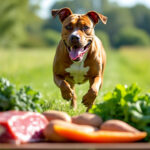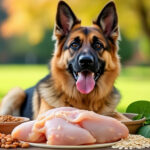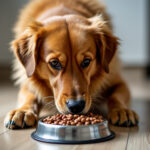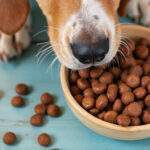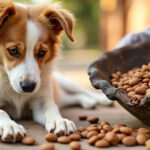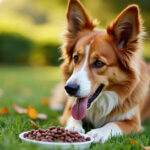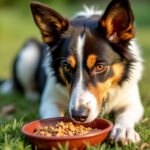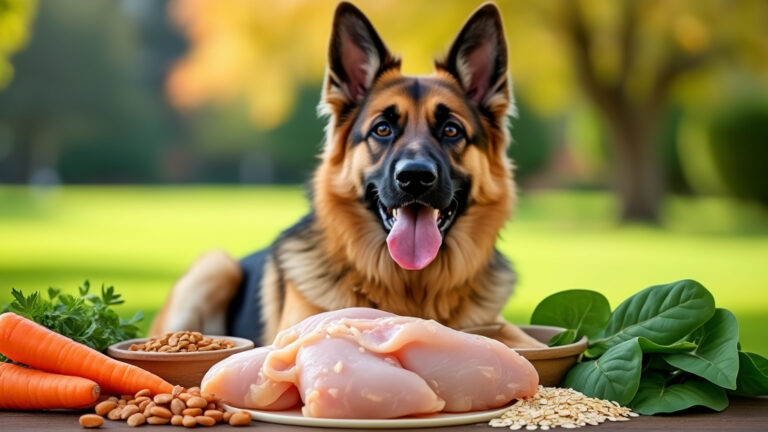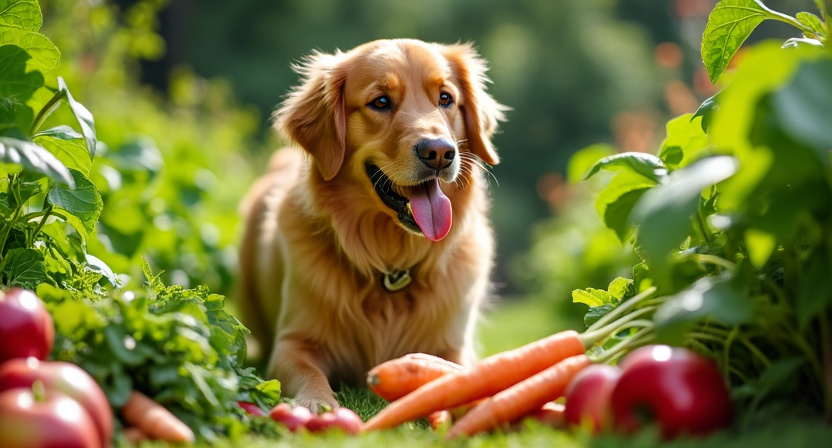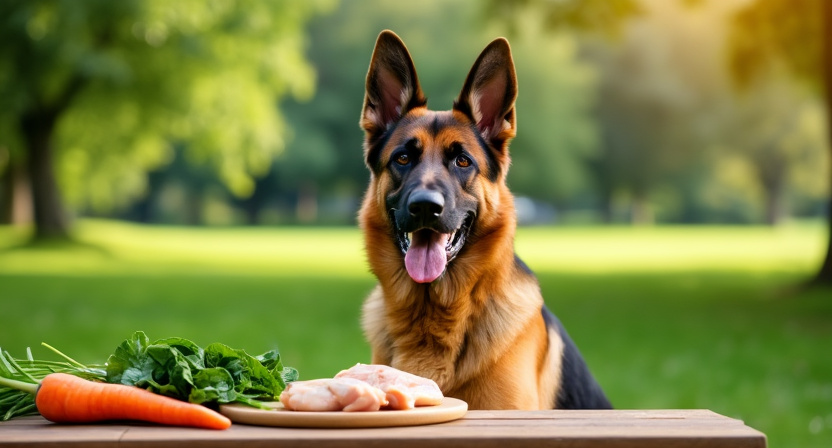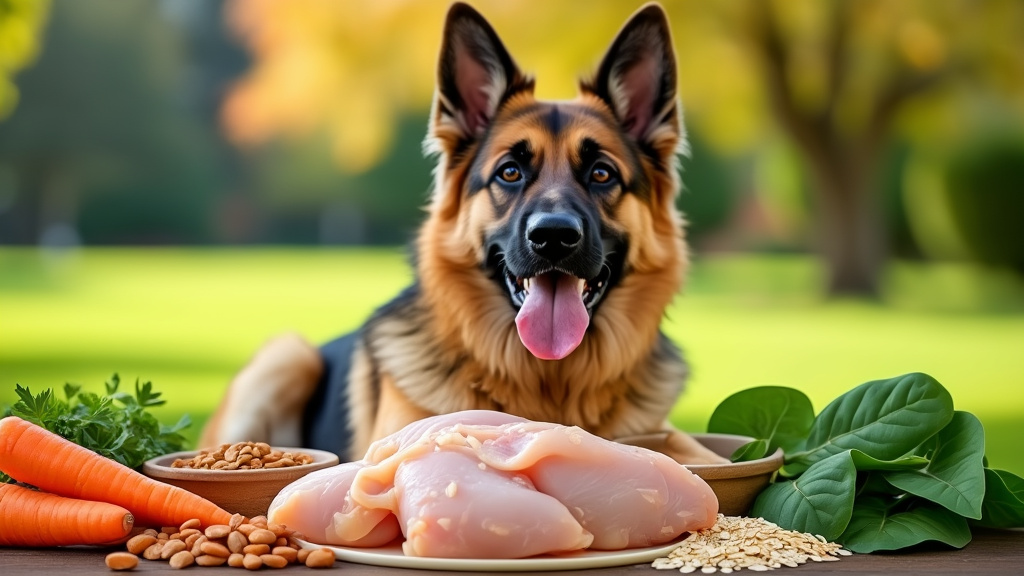German Shepherd Dogs (GSDs) need a well-balanced diet to support their quick growth and development. High-quality protein sources should make up 25-30% of their meals. For optimal GSD health, I recommend including moderate fat content, balanced calcium and phosphorus, DHA for brain and eye development, essential vitamins and minerals, and joint-supporting supplements like glucosamine and chondroitin.
Table of Contents
ToggleKey Takeaways:
- High-quality protein (25-30%) and moderate fat (12-16%) are crucial for GSD nutrition
- Specific formulas address the unique needs of German Shepherds
- Top brands include Royal Canin, Hill’s Science Diet, and Purina Pro Plan
- Combining wet food with dry kibble offers a balanced diet approach
- Tailor portions based on age, weight, and activity level for best health
Nutritional Essentials for German Shepherd Puppies
Key Components for Optimal Growth
German Shepherd puppies need a carefully balanced diet to support their rapid growth and development. I recommend focusing on high-quality protein sources like chicken, turkey, or lean beef, making up 25-30% of their diet. Moderate fat content (12-16%) is crucial for energy and overall health. Balanced calcium and phosphorus are essential for proper bone development, while DHA supports brain and eye health. Don’t forget vital vitamins and minerals, particularly A, D, and E. For joint health, look for food containing glucosamine and chondroitin. Here’s a quick breakdown of key nutritional components:
- High-quality protein (25-30%)
- Moderate fat (12-16%)
- Balanced calcium and phosphorus
- DHA for brain and eye development
- Essential vitamins and minerals
- Glucosamine and chondroitin for joints
Top Dog Food Options for German Shepherds
Dry Kibble and Wet Food
Dry kibble is a popular choice for German Shepherds. It’s convenient, promotes dental health, and offers balanced nutrition at an economical price. I recommend brands like Royal Canin and Hill’s Science Diet for their quality ingredients and specialized formulas.
Wet food, on the other hand, has a higher moisture content and is more palatable. It’s particularly suitable for young puppies or older dogs with dental issues. Brands like Purina Pro Plan offer excellent wet food options that can be mixed with dry kibble for added variety.
Alternative Feeding Options
Raw diets have gained popularity for their potential benefits to coat health, dental hygiene, and energy levels. However, it’s crucial to consult a vet before starting a raw diet to ensure safety and nutritional balance.
For those interested in homemade food, it provides control over ingredients but requires careful planning. I suggest working with a veterinary nutritionist to create a balanced meal plan that meets your German Shepherd’s specific needs.
Blue Buffalo and Eukanuba also offer high-quality options tailored for large breeds like German Shepherds. Remember, the best food choice depends on your dog’s age, activity level, and health status. Always transition to new foods gradually to avoid digestive issues.
Breed-Specific Nutrition: German Shepherd Formulas
Tailored Nutrition for German Shepherd Puppies
I’ve found two top-notch options for German Shepherd puppies. Royal Canin German Shepherd Puppy Food is specially crafted to support digestive health and bone development. It’s a great choice for owners looking to give their pups a strong start. Another excellent option is Hill’s Science Diet Large Breed Puppy Food, which comes highly recommended by vets. This formula provides balanced nutrition crucial for growing German Shepherds.
Key Nutritional Components
These breed-specific formulas often include:
- Essential fatty acids for a healthy, shiny coat
- Joint supplements to support developing bones and joints
- Easily digestible proteins for optimal nutrient absorption
By choosing a breed-specific formula, you’re giving your German Shepherd puppy the best nutritional foundation for a healthy life.
Key Ingredients for Optimal German Shepherd Health
Protein-Rich Diet for Peak Performance
I’ve found that German Shepherds thrive on a protein-rich diet. Top-quality protein sources like chicken, turkey, flounder, and whole mackerel are essential. Chicken meal is particularly beneficial, as it’s more concentrated in protein and nutrients than fresh chicken. For optimal health, I recommend foods with balanced fat content (12-16%) and carbohydrates (34% on a dry matter basis). These ratios support your GSD’s energy needs and digestive health. Don’t overlook the importance of chelated minerals, such as zinc proteinate, which are more easily absorbed by your dog’s body. By focusing on these key ingredients, you’ll provide your German Shepherd with the nutrition needed for a healthy, active life.
Top Recommended Brands for German Shepherd Puppies
Diverse Diet Options for Growing GSDs
I’ve identified several top-tier dog food brands that cater to the nutritional needs of German Shepherd puppies. For those preferring dry food, Royal Canin, Hill’s Science Diet, Purina Pro Plan, Blue Buffalo, and Eukanuba offer excellent choices. These brands provide balanced nutrition crucial for your puppy’s growth and development.
If you’re leaning towards grain-free options, consider Orijen, Taste of the Wild, or Merrick. These brands focus on high-protein formulas that mirror a more natural diet for your GSD puppy.
For a fresh approach to feeding, Nom Nom and Ollie stand out. They use human-grade ingredients to create nutritionally complete meals for your growing pup. Here’s a quick rundown of the options:
- Dry food: Royal Canin, Hill’s Science Diet, Purina Pro Plan, Blue Buffalo, Eukanuba
- Grain-free: Orijen, Taste of the Wild, Merrick
- Fresh food: Nom Nom, Ollie
Each of these brands offers specific formulas for large breed puppies, ensuring your German Shepherd gets the right balance of nutrients. Remember to transition gradually between foods and consult your vet before making significant changes to your puppy’s diet.
Feeding Guidelines and Best Practices
Balanced Diet Approach
I recommend mixing wet food with dry kibble to provide a balanced diet for your German Shepherd. This combination ensures a variety of nutrients and textures, keeping your dog satisfied and healthy. For those interested in homemade options, here’s a simple recipe:
- 2 cups lean protein (chicken, beef, or fish)
- 1 cup complex carbohydrates (brown rice or sweet potatoes)
- 1/2 cup vegetables (carrots, green beans, or peas)
- Essential supplements (as advised by your vet)
Customizing Your Dog’s Diet
It’s crucial to adjust portions based on your dog’s age, weight, and activity level. For raw diets, consult your veterinarian to ensure safety and nutritional completeness. Remember, every dog is unique, so tailor their diet accordingly for optimal health and vitality.
Sources:
Ultimate Puppy
Just Answer
Dog Food Advisor
Frequently Asked Questions
What percentage of protein should be in a German Shepherd puppy’s diet?
A German Shepherd puppy’s diet should contain 25-30% high-quality protein.
How much fat should be in a German Shepherd puppy’s food?
The recommended fat content for German Shepherd puppies is moderate, ranging from 12-16%.
What are some key nutrients for German Shepherd puppies?
Key nutrients include balanced calcium and phosphorus, DHA for brain and eye development, essential vitamins and minerals, and glucosamine and chondroitin for joint health.
Is dry kibble or wet food better for German Shepherds?
Both have their benefits. Dry kibble is convenient and promotes dental health, while wet food has higher moisture content and is more palatable. A combination of both can be ideal.
Are raw diets recommended for German Shepherds?
Raw diets can have potential benefits, but it’s crucial to consult a vet before starting to ensure safety and nutritional balance.
What are some top dog food brands for German Shepherd puppies?
Top brands include Royal Canin, Hill’s Science Diet, Purina Pro Plan, Blue Buffalo, and Eukanuba. For grain-free options, consider Orijen, Taste of the Wild, or Merrick.
How often should I feed my German Shepherd puppy?
Feeding frequency depends on the puppy’s age, but generally, puppies should be fed 3-4 times a day, gradually decreasing to 2-3 times as they grow older.
Can I make homemade food for my German Shepherd?
Yes, but it’s important to work with a veterinary nutritionist to create a balanced meal plan that meets your dog’s specific needs.

